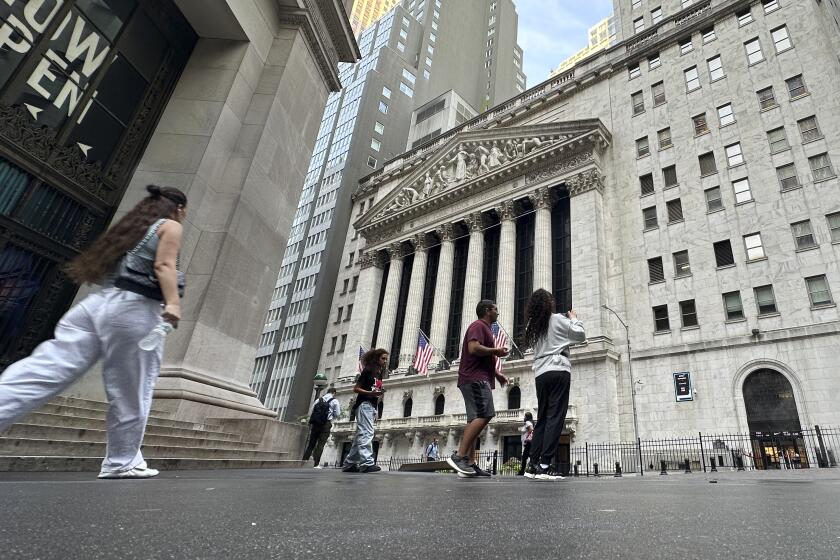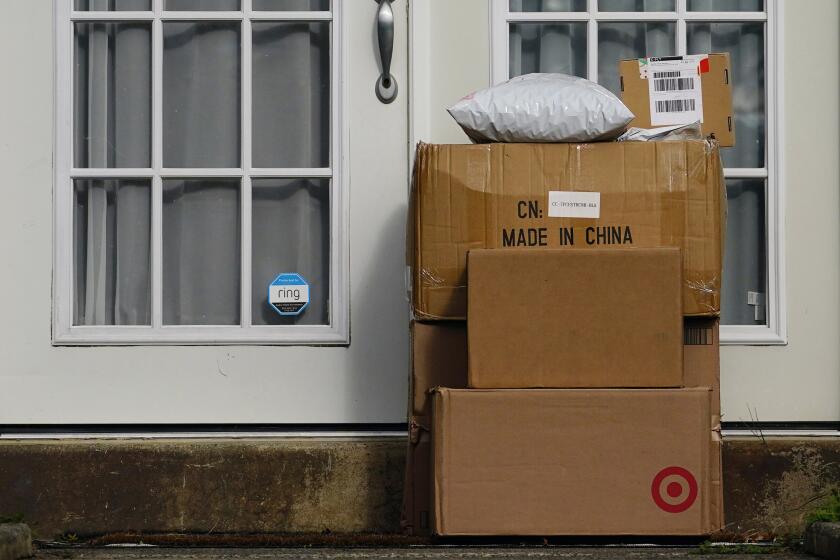E-Trade to Offer Trading After Hours With Instinet
Wall Street’s mad dash toward 24-hour stock trading for individual investors accelerated Tuesday as online brokerage E-Trade Group said it is joining with electronic trading network Instinet to roll out after-hours trading by next month.
The No. 2 Internet broker said its 1.2 million customers will be able to trade weekdays from 1 p.m. Pacific time--just as the New York Stock Exchange and Nasdaq Stock Market close--until 3:30 p.m.
Orders will be routed to Instinet, a unit of Britain’s Reuters Group. Instinet is the oldest and largest of the burgeoning electronic communications networks, or ECNs, which are competing aggressively to steal trading activity from the NYSE and Nasdaq.
Instinet, which trades about 170 million shares a day and claims almost 20% of trading in Nasdaq stocks, has been used for three decades by institutional investors to swap stocks after regular market hours.
E-Trade, Instinet and many competitors now believe that there is a hunger among individual investors to trade after hours.
As with institutional investors, the biggest potential advantages for individual investors in a longer trading session are the ability to react to late-breaking news and to immediately make trades that would otherwise pile up for execution at the market’s opening the next day.
The crush of orders each morning, particularly on Nasdaq, can result in wild swings and poor prices for small investors, some market analysts have argued.
However, after-hours trading also carries the risk of high volatility, experts say, if volume in individual stocks is meager.
But by signing on with Instinet, E-Trade may reduce the volatility problem, said Russell Keene, an analyst at Putnam, Lovell, de Guardiola & Thornton Inc. With many institutional investors already in the Instinet market, there is a degree of “protection” against doing transactions at wild prices, Keene said.
Still, the Securities and Exchange Commission has expressed concern that a pell-mell start to after-hours trading could be dangerous for small investors. But the SEC hasn’t interfered with the plans of various companies to roll out such services.
E-Trade’s announcement ups the ante in the after-hours trading race. Moreover, the firm’s chief executive, Christos Cotsakos, said E-Trade intends to push quickly toward round-the-clock trading.
Within four months, E-Trade will launch early-morning trading, from 4 a.m. Pacific time until the regular markets open at 6:30 a.m., Cotsakos said. Within a year, the firm will have “the whole day covered,” he said.
E-Trade’s strategy appears designed to distinguish its afternoon session as much as possible from after-hours rivals.
Some brokerages, including Muriel Siebert & Co., say they already let customers trade after hours through Instinet or other ECNs. But unlike E-Trade, they often require customers to call brokers rather than send orders online.
E-Trade’s session will get a jump on later after-hours systems planned by Wit Capital Corp. and MarketXT Inc., formerly Eclipse Trading. Wit’s daily session, for example, won’t begin until 3 p.m. Pacific time.
Datek Online Brokerage Services last month became one of the first firms to offer late trading for small investors, with a session from 1 p.m. to 2:15 p.m. Pacific time.
Datek President John Mullin said Tuesday that his firm will extend its after-hours trading next month.
But unlike Datek, which handles only Nasdaq stocks, E-Trade said it also will take orders for NYSE stocks.
After-hours trading for individuals seemed unlikely as recently as a year ago. Now, analysts believe that most large online brokers will offer late trading in one form or another by year-end.
“Whatever one [company] does here, the others are going to have available within months,” said James Marks, an analyst at Deutsche Banc Alex. Brown.
E-Trade will charge regular commission rates for after-hours trades. The firm’s Web site will list “bid” and “ask” prices at which stocks are trading on Instinet so that investors can follow trading activity.
But investors sending orders to Instinet via E-Trade will most likely be encouraged by E-Trade to use “limit” orders--that is, orders specifying the price at which they’re willing to trade. That is different from a market order, which is an order to trade at the stock’s prevailing price, whatever it may be.
Limit orders are required on most after-hours systems and on ECNs. The risk with limit-order systems is that if another investor isn’t willing to trade at the same price, an investor’s order will go unfilled.
The investor then may have to adjust the price, share size or both to complete a trade.
Meanwhile, the NYSE and Nasdaq, fearful of losing more trading business to rivals, have announced plans to offer after-hours sessions. But the NYSE has delayed late trading until next year. Nasdaq, after once saying it could start by September, has backed off and has yet to set a date.
E-Trade and Instinet also are investors in an ECN known as Archipelago. E-Trade is moving ahead with plans to offer customers access to Archipelago within the next few months, Cotsakos said.
Shares of Menlo Park, Calif.-based E-Trade jumped $3.38 to close at $30.25 on Nasdaq.






